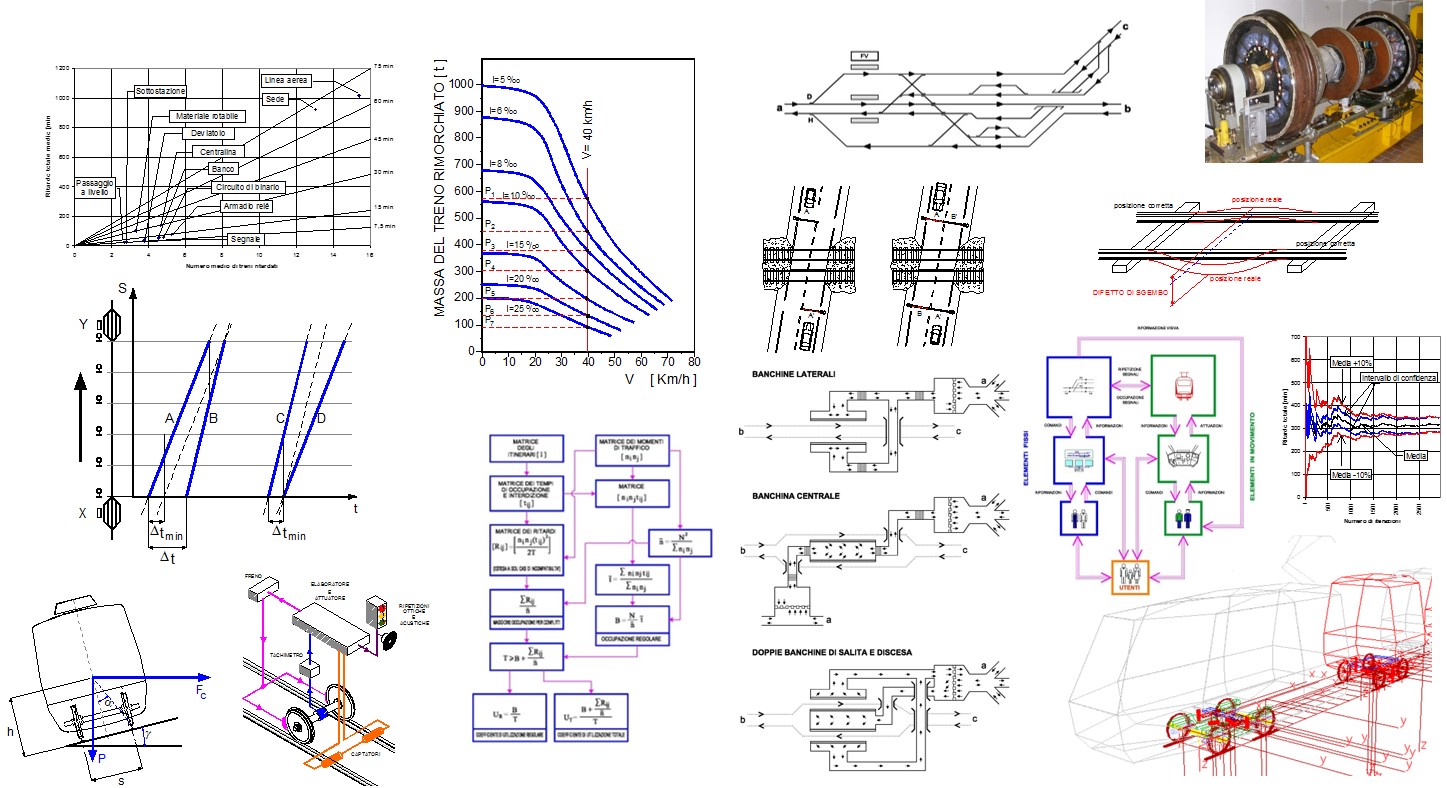Railway Engineering

Instructor information
Module leader: Prof. Stefano Ricci, Prof. Riccardo Licciardello
Course information
ECTS: 12 credits
Status: Compulsory
Semester: 3
Hours: 60/36 (lectures/exercises)
Link: course page
Objectives
To provide with basic elements of knowledge concerning the railway transport system and the educational elements to study the railway complex system operation, as well as the design criteria of infrastructure, vehicle and operation itself.
Syllabus outline
- Introduction and educational goals
- Railway line layout
- Operational constraints due to infrastructure, rolling stock and personnel
- Timetable planning and train composition
- Line headway
- Functions and typology of signalling systems
- Integrity and efficiency check during the trip
- Level crossings protection
- Criteria and methods for signalling maintenance
- Traffic on lines and stations
- Station interlocking
- Station layouts
- Metro lines plants
- Marshalling yards
- Reliability, maintainability and availability
- Services quality requirements
- Traffic control and management systems
- Dynamic of railway vehicles
- Structural components of vehicles. Suspension. Contact forces. Wheelset-rail interaction. Vertical stiffness. Vertical dynamics. Adhesion. Running stability in straight and in curve. Construction features in favour of stability. Experimental approach to driving dynamic studies.
- Formulation and development of the design of the traction system. Maximum speed of track. Correlations between commercial speed, vehicle speed, distance between stops, acceleration. Range of characteristic parameters of the vehicle for different categories of services. Correlation between mass of the locomotive, trailer mass and slope. Resistance to motion, power, traction performance. Power supply. Maintenance.
- Operation of rail systems. Timetable design. Traffic capacity at the station. Probabilistic method. Fixed Timetable method. Numerical exercises on the topics of the program.
Essential reading list
Recent theses
- Yawar Mahmood Salman (2019-2020) Technical and Functional Specifications of Railway Tunnels in India.
- Ashwani Kumar Malviya (2019-2020) A multicriteria analysis of women inclusion in transport system
- Martini Francesco (2019-2020) Effects of fire in railway tunnels: Application of fire dynamics simulation methods
- Elena Silvia Biglio (2019-2020) Maintenance of rail freight wagon braking systems: optimization of wear and resources
- Zahra Lahijanian (2019-2020) Station Accessibility Assessment by Displacement Data Management
- Nadia Kaviani (2019-2020) Identification of the Most Suitable Sensor Technology to Measure the Transversal Position of the Wheel in Relation to Rail
- Paola Ximena Cardozo Chaparro (2019-2020) Redesign of the internal railway of the Civitavecchia port, according to the strategic objectives of Port Regulatory Plan
- Jaime Leandro Herrera G. (2019-2020) Aerodynamic risk of passengers standing on railway platforms: a stress-strength approach
- Elisabetta Fiorelli (2019-2020) Low demand bus services from schedule-based to demand responsive design in the South of Umbria
- Sayyed Jafar (2019-2020) Assessment of innovations in ERTMS level3
- Giulia Capodacqua (2019-2020) Floating Cellular and Car Data acquisition for the development of traffic studies knowledge: a railway targeted case study
- Mohammad Hassan Davoudi Zavareh (2019-2020) Operation and energy management in new tram lines: innovations for Brescia case study
- René Lancia (2019-2020) Intermodality, multimodality and innovative transport systems towards sustainability and inclusion: application to the Roma – Avezzano railway line
- Yakaswami Thangellapalli(2019-2020) Role of decision support systems in railway infrastructure maintenance
- Alessio Lucchesini (2019-2020) Accessibility analysis of the Napoli-Afragola High Speed station
- Chilumulla Praneeth Kumar (2018-2019) Analysis of the Indian Maintenance center for WAG-9 Electric Locomotives and improve for new railways service
- Musham Srinivas (2018-2019) Measures for Better Empty Container Management
- Sina Parasteh (2018-2019) Effective parameters for capacity assessment of an upgraded railway: the case study of Ghana Western Line
- Shokoufeh Amirkhani (2018-2019) Effective signaling system management on an upgraded railway: The case study of Ghana Western Line
- João Marcelo Silva de Almeida (2018-2019) Incidents with passengers in Portugal at the platform-train interface
- Sai Kumar Vuyyuru Venkata(2018-2019) Analysis of The Indian Maintenance Centre for Diesel –Electric Locomotive and Improve for New Railways Service
- Orod Shamsafar (2018-2019) Influence of Longitudinal Train Dynamic on the running safety of long freight trains
- Atieh Kiani Nejad Oshah (2018-2019) A New European Rapid Railway Line in Sicily
- Lorenzo Franchi (2018-2019) Port Greening: Discrete Choice Analysis Investigation on Environmental Parameters Affecting Container Shipping Companies’ Behaviours
- Aytan Fikratli (2018-2019) International freight railway transport management:current state improvement in a multi-level structure
- Seyedmohammad Fatemi (2018-2019) Technical and Economic Feasibility of Using Steel Fiber Reinforced Concrete (SFRC) in Slap line of Railroads
- Sindhura Chellaboina (2018-2019) Reduction of Noise and Vibration
- Aytan Fikratli (2018-2019) International freight railway transport management: current state improvement in a multi-level structure
- Naga Sai Dilip Kumar Akula (2018-2019) Digital Impact on the Railway Vehicle Maintenance
- Yatish Manju (2018-2019) Dynamic behaviour of high speed train: performances and comparision between ETR1000, ETR500, ICE3 and TGV
- Sai Arvind Atluri (2018-2019) Capacity Analysis and Improvement Proposals for Secunderabad Station
- Filippo Zanzarin (2017-2018) Malpensa Airport North Railway Link: impact of expected traffic onto the existing network
- Daniele Perrino (2017-2018) Rail freight transport: multicriteria analysis of traffic control room workloads
- Mohamed Nabil Mohamed Elsayed Eldigwi (2017) Impact of running gear design on train energy consumption
- Fatima Chemsi (2017-2018) Design, validation and commissioning processes for metal structures belonging to the railway signaling infrastructure
- Francesco Calabrese (2017-2018) Use of neural networks for the predictive maintenance of rolling stock
- Houshang Kheiri Sadigh (2017-2018) CITYFLO 350 Signaling System Interface between ATP Telegrams and Brake curve Istanbul new Metro Line Study case
- Mainak Chakraborty (2017-2018) Procedure to place railway Electronic Interlocking products in service
- Sharat Chandra Dwadasi (2017-2018) Impacts of innovative running gear for trains: focus on energy consumption and wheel set maintenance
- Lorenzo Roazzi (2017-2018) Performances and Reliability Improvement of InterCity Coaches DC/AC Converter based on FMECA Analysis
- Federico Coltella (2017-2018) ERTMS implementation on existing lines Impacts assessment and performances in future scenarios
- Francesco Saverio Falco (2017) Planning of an integrated transport network: the integration in the railway node of Bologna
- Giulia Petracchini (2017-2018) A step-by-step process for developing a competitive rail transport network. The Sultanate of Oman case study
- Behrooz Salehi (2017-2018) Tehran station improvement and plan for enhancement of medium and high-speed trains
- Syed Mohammad Hossein Mousavi (2017-2018) Optimization of the speed of trains on the critical segments
- Gabriele Pistilli (2017-2018) Controlled temperature short sea shipping as feasible and sustainable alternative to road transport
- Michele Prete (2017-2018) Capacity analysis in urban railway nodes with High Density ERTMS technology
- Vahid Ranjbar (2016-2017) European Rail Traffic Management System Level 1 plus Radio Infill Unit capacity performance
- Mohammad Vajihi (2016-2017) Solar-powered light rail vehicle and tram systems
- Eyad Sherif (2016-2017) Traffic concepts on High Speed railway services
- Claudio Croccolo (2017) Italian rail freight transport: management and operations to match market requirements
- Altay Jabbarov (2017) Certification process of a new constituent in railway field: the case of low vibration track-high attenuation
- Marco Moretti (2017) Upgrading Florence public transport system to incorporate new tramlines
- Filippo Maria Rea (2017) Intercity coaches HVAC performance and reliability improvement through engineering failure analysis of refrigerator compressors: effects on transport service availability


